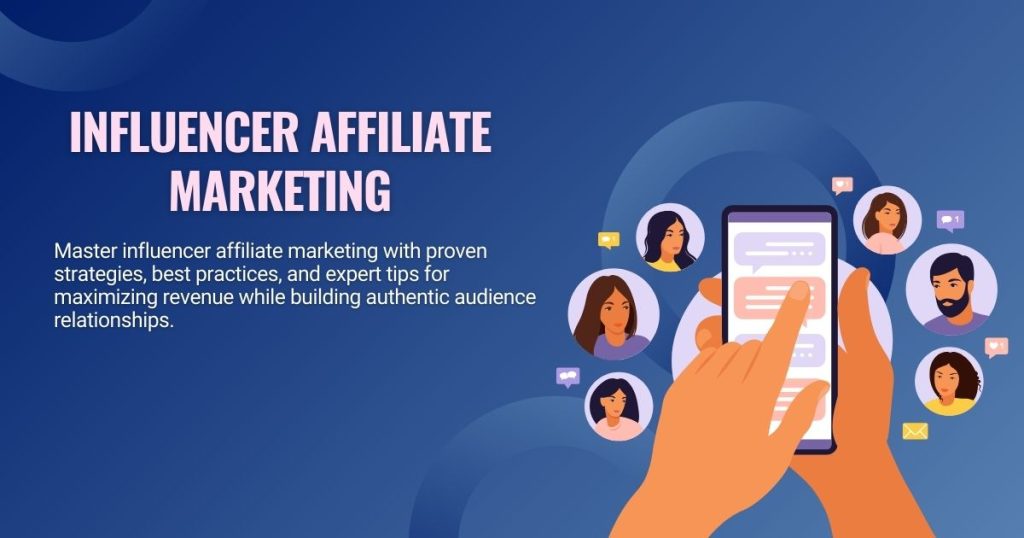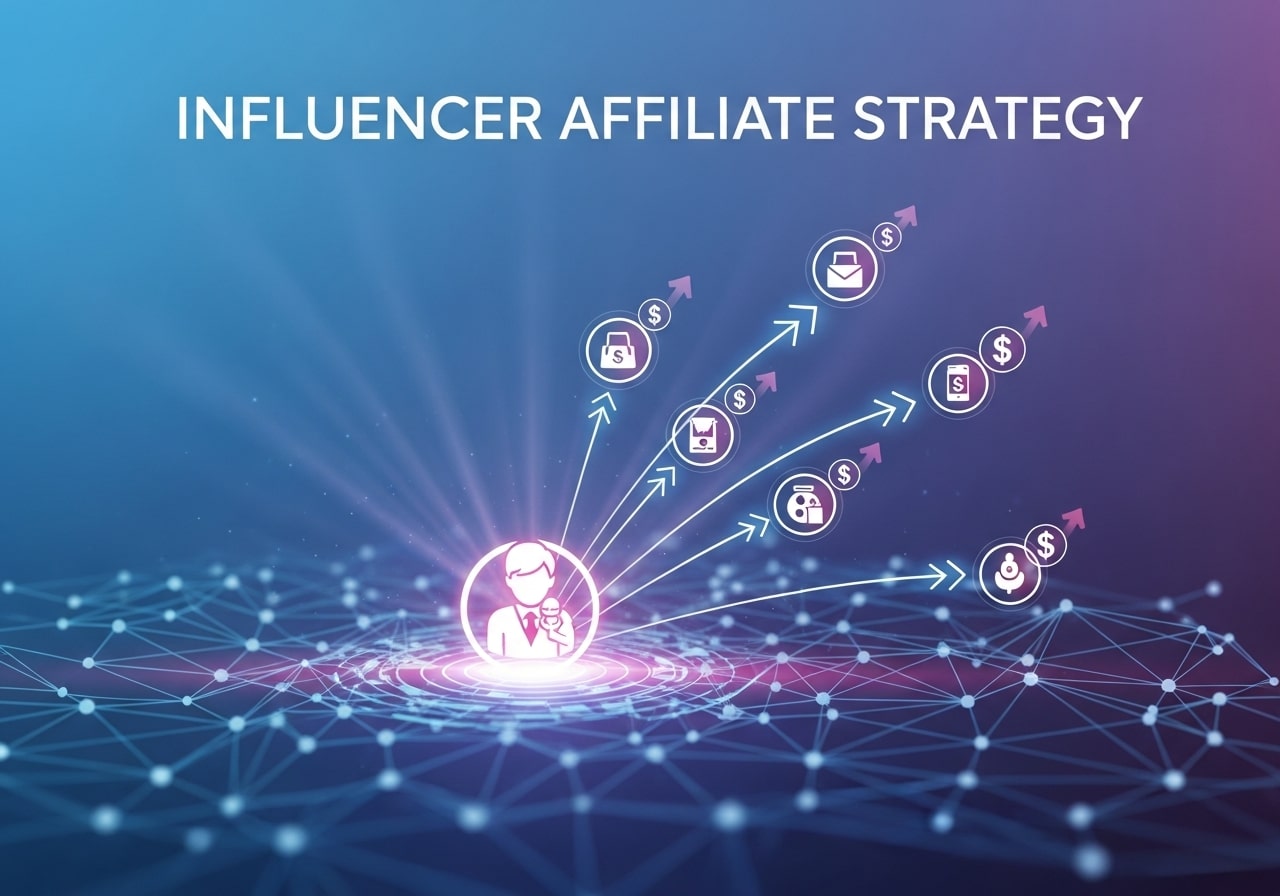Influencer Affiliate Marketing: The Complete Guide for 2026

Influencer affiliate marketing combines social media influence with performance-based commissions, allowing creators to earn by promoting products authentically. Success relies on audience understanding, strategic partnerships, compelling content, transparency, and cross-platform engagement, driving revenue for both brands and influencers.
Affiliate marketing has evolved far beyond banner ads and email campaigns. With social media creators commanding millions of followers and generating billions in sales, influencer affiliate marketing has become one of the most powerful revenue streams for both brands and content creators.
This comprehensive guide explores everything you need to know about influencer affiliate marketing—from understanding the fundamentals to implementing strategies that drive real results. Whether you’re a brand looking to expand your affiliate program or an influencer ready to monetize your audience, you’ll discover actionable insights to maximize your success in this dynamic space.
The influencer marketing industry is projected to reach $21.1 billion in 2024, with affiliate partnerships representing a significant portion of this growth. By combining the trust and engagement of influencer marketing with the performance-based model of affiliate marketing, businesses can achieve remarkable returns while influencers build sustainable income streams.
What is Influencer Affiliate Marketing?

Influencer affiliate marketing occurs when social media creators promote products or services through unique tracking links, earning commissions on sales generated through their recommendations. Unlike traditional sponsored posts, where influencers receive upfront payments, affiliate partnerships tie compensation directly to performance.
This model benefits all parties involved. Brands only pay for actual results, influencers can earn ongoing income from successful recommendations, and audiences receive authentic product suggestions from trusted sources. The key difference from standard affiliate marketing lies in the personal connection influencers have with their followers, often leading to higher conversion rates than traditional affiliate channels.
Types of Influencer Affiliate Programs

Brand-Direct Programs
Many companies operate their own affiliate programs, allowing influencers to apply directly through brand websites or affiliate platforms. These programs often offer higher commission rates and exclusive perks, as brands maintain complete control over their partnerships.
Popular direct programs include Amazon Associates, Target’s affiliate program, and individual brand initiatives from companies like Nike, Sephora, and HelloFresh. Direct programs typically provide better support, exclusive offers, and stronger brand relationships.
Affiliate Networks
Networks like ShareASale, Commission Junction, and Impact connect influencers with hundreds of brands through single platforms. While commission rates may be lower than direct programs, networks offer convenience and variety, making them ideal for influencers wanting to diversify their partnerships.
These platforms also provide robust tracking tools, consolidated payments, and simplified reporting across multiple brand partnerships.
Hybrid Programs
Some brands combine affiliate marketing with traditional influencer partnerships, offering base fees plus performance bonuses. This approach reduces risk for influencers while maintaining performance incentives for brands.
Building an Effective Influencer Affiliate Strategy

Define Your Niche and Audience
Successful influencer affiliate marketing starts with clear audience understanding. Analyze your followers’ demographics, interests, and purchasing behaviors to identify which products or services would genuinely benefit them.
Authenticity drives affiliate success more than follower count. Micro-influencers with 10,000-100,000 engaged followers often outperform larger accounts in affiliate conversions because their recommendations feel more personal and trustworthy.
Choose Relevant Partnerships
The most successful affiliate influencers only promote products they genuinely use and believe in. Your audience can spot inauthentic recommendations quickly, and promoting irrelevant products damages trust and engagement rates.
Research potential partners thoroughly. Test products when possible, understand company values, and ensure alignment with your personal brand before entering into any affiliate agreement.
Create Compelling Content
Effective affiliate content goes beyond simple product showcases. Develop content that educates, entertains, or solves problems while naturally incorporating your affiliate recommendations.
Tutorial videos, product comparisons, and lifestyle content perform exceptionally well for affiliate marketing. Stories, reels, and live videos also create urgency and drive immediate action from engaged audiences.
Best Practices for Influencer Affiliate Marketing
Transparency and Disclosure
The Federal Trade Commission requires clear disclosure of affiliate relationships. Always include #affiliate, #ad, or similar hashtags in your posts. Many influencers also add disclosure statements in their bio or use platform-specific tools like Instagram’s paid partnership labels.
Transparency actually builds trust with audiences. Research shows that proper disclosure can increase engagement rates as followers appreciate honesty about business relationships.
Track Performance Metrics
Monitor key performance indicators beyond just commission earnings. Track click-through rates, conversion rates, average order values, and audience engagement to understand which content types and products resonate most with your followers.
Most affiliate programs provide detailed analytics, but consider using additional tracking tools like Google Analytics or specialized influencer platforms to gain deeper insights into your performance.
Optimize Content Timing
Post timing significantly impacts affiliate marketing success. Analyze your audience insights to identify when your followers are most active and likely to make purchasing decisions.
Consider seasonal trends, pay cycles, and shopping behaviors when planning affiliate content. Many successful influencers report higher conversion rates when posting affiliate content on weekends and evenings when audiences have more time to research and shop.
Common Challenges and Solutions
Audience Fatigue
Overloading followers with affiliate content can decrease engagement and trust. Maintain a healthy balance between affiliate posts and regular content. The 80/20 rule works well—80% valuable, non-promotional content and 20% affiliate or sponsored material.
Vary your affiliate content formats and focus on storytelling rather than direct selling to maintain audience interest and engagement.
Commission Structure Confusion
Different programs offer varying commission structures—flat rates, percentage-based, tiered systems, or recurring commissions. Understand each program’s terms thoroughly, including cookie durations, attribution models, and payment schedules.
Keep detailed records of your partnerships, including commission rates, payment terms, and performance benchmarks to optimize your affiliate portfolio over time.
Platform Algorithm Changes
Social media algorithms constantly evolve, affecting content reach and engagement rates. Diversify your platforms and maintain direct communication channels with your audience through email lists or personal websites.
Building an owned audience reduces dependence on platform algorithms and creates more stable, long-term affiliate income streams.
Leveraging Social Proof for Higher Conversions
Social proof is a powerful driver of affiliate success. When audiences see genuine recommendations from peers or other trusted influencers, they are more likely to make a purchase. Influencers can showcase user reviews, testimonials, or unboxing experiences to reinforce credibility. Highlighting how many people already use and enjoy a product creates trust and reduces hesitation. Social proof works best when integrated naturally into content rather than forced. By combining authentic storytelling with real-world evidence, influencers can boost conversion rates, increase audience engagement, and create a stronger sense of community around the brands they promote.
Incorporating Seasonal and Trend-Based Campaigns
Timing plays a critical role in affiliate marketing performance. Influencers can increase revenue by aligning campaigns with seasonal events, holidays, or trending topics relevant to their audience. For instance, launching product promotions before Black Friday or summer vacations can drive higher engagement and sales. Monitoring emerging trends on social platforms, hashtags, or viral challenges allows influencers to create timely, relevant content. By combining audience insights with market trends, affiliates can capture attention when consumer interest is at its peak. Seasonal and trend-focused campaigns also allow brands to maximize ROI by targeting periods of high purchase intent.
Building Cross-Platform Affiliate Strategies

Relying on a single social media platform limits reach and revenue potential. Influencers benefit from distributing affiliate content across multiple channels, such as Instagram, TikTok, YouTube, blogs, and newsletters. Each platform has unique strengths: Instagram and TikTok excel in short-form engagement, YouTube supports in-depth reviews, and newsletters maintain direct audience communication. Cross-platform strategies also reduce dependency on changing algorithms and provide more consistent traffic and conversions. Repurposing content and tailoring it to platform-specific formats ensures better visibility and engagement. By adopting a multi-channel approach, affiliates can diversify revenue streams and create a more resilient, long-term affiliate marketing strategy.
Maximizing Affiliate Marketing Revenue
Negotiate Better Terms
As you prove your value through successful campaigns, negotiate improved commission rates, longer cookie periods, or exclusive offers for your audience. Brands value affiliates who drive quality traffic and sales, not just clicks.
Document your performance metrics and present data-driven cases for better partnership terms. Many brands are willing to offer improved rates to top-performing affiliates.
Diversify Your Portfolio
Don’t rely on single affiliate programs or product categories. Diversification protects against program changes, seasonal fluctuations, and market shifts while providing multiple revenue streams.
Consider mixing high-ticket items with recurring subscription services and everyday products to create balanced, consistent income streams.
Build Long-Term Relationships
Focus on developing strong relationships with affiliate managers and brand partners. Long-term partnerships often lead to exclusive opportunities, higher commission rates, and priority access to new products or promotions.
Communicate regularly with your affiliate managers, provide feedback on programs, and share success stories to strengthen these valuable business relationships.
Legal and Ethical Considerations
FTC Compliance
Beyond basic disclosure requirements, ensure your affiliate marketing practices comply with all relevant advertising standards. The FTC regularly updates guidelines for social media advertising, including affiliate marketing disclosure requirements.
Keep records of all sponsored and affiliate content, including disclosure methods and partnership agreements, in case of regulatory inquiries.
Tax Implications
Affiliate marketing income is taxable, and requirements vary by location and income levels. Maintain detailed records of all affiliate earnings, expenses, and business activities.
Consider consulting with tax professionals familiar with influencer income to ensure proper compliance and optimize your tax strategy.
The Future of Influencer Affiliate Marketing

Technology continues to reshape influencer affiliate marketing through improved tracking, personalized recommendations, and seamless integration tools. Live shopping features, augmented reality try-ons, and direct checkout capabilities are reducing friction between discovery and purchase.
Artificial intelligence is enabling more sophisticated audience matching between brands and influencers, while blockchain technology may provide more transparent tracking and payment systems.
The shift toward authenticity and long-term partnerships suggests the industry is maturing beyond quick, transactional relationships toward sustainable, value-driven collaborations.
Building Your Affiliate Marketing Success
Influencer affiliate marketing offers tremendous opportunities for both brands and creators willing to invest in authentic, strategic partnerships. Success requires dedication to your audience, careful partner selection, and consistent optimization of your approach.
Start by identifying affiliate programs that align with your audience and values. Focus on building genuine relationships with your followers and affiliate partners while maintaining transparency in all your promotional activities.
Ready to launch your influencer affiliate marketing journey? Begin by auditing your current audience engagement, researching relevant affiliate programs, and developing a content calendar that balances valuable content with strategic affiliate promotions.
Frequently Asked Questions (FAQ)
1. What is influencer affiliate marketing?
Influencer affiliate marketing occurs when social media creators promote products or services using unique tracking links, earning commissions on sales generated through their recommendations. Compensation is performance-based rather than upfront.
2. How does it differ from traditional affiliate marketing?
The main difference is the personal connection influencers have with their audience. Their recommendations often feel authentic, resulting in higher engagement and conversion rates than standard affiliate channels.
3. What types of influencer affiliate programs exist?
Brand-direct programs are run by individual companies and often offer higher commissions and exclusive perks. Affiliate networks, like ShareASale or Impact, connect influencers with multiple brands. Hybrid programs combine upfront payments with performance-based commissions.
4. How do I choose the right affiliate partnerships?
Select products or services that align with your audience’s interests and your personal brand. Test products when possible, research company values, and avoid promoting irrelevant or inauthentic offerings.
5. What content works best for affiliate marketing?
Educational, entertaining, or problem-solving content performs best. Tutorials, product comparisons, lifestyle content, stories, reels, and live videos drive engagement and conversions more effectively than direct sales pitches.
6. How should I disclose affiliate relationships?
Always follow FTC guidelines by including #affiliate, #ad, or platform-specific paid partnership labels. Transparency builds trust and improves audience engagement.
7. How can I track affiliate performance?
Monitor click-through rates, conversion rates, audience engagement, and average order value. Use program analytics, Google Analytics, or influencer platforms for deeper insights.
8. What are common challenges in influencer affiliate marketing?
Challenges include audience fatigue, confusing commission structures, and algorithm changes. Solutions involve diversifying content, understanding program terms, and building an owned audience through email or websites.
9. How can I maximize affiliate revenue?
Negotiate better commission rates, diversify your affiliate portfolio across products and platforms, and cultivate long-term relationships with brands and affiliate managers.
10. Are there legal and tax considerations?
Comply with FTC disclosure guidelines and maintain records of all affiliate activity. Affiliate income is taxable, so keep detailed earnings and expense records and consult a tax professional if needed.
11. What does the future of influencer affiliate marketing look like?
Emerging technologies like AI, live shopping, AR try-ons, and blockchain are improving tracking, personalization, and payments. The industry is moving toward authentic, long-term partnerships rather than short-term transactional campaigns.
12. How do I get started with influencer affiliate marketing?
Audit your audience, research relevant programs, choose partners that align with your values, and create a content calendar balancing valuable content with strategic affiliate promotions. Consistency and authenticity are key to success.





